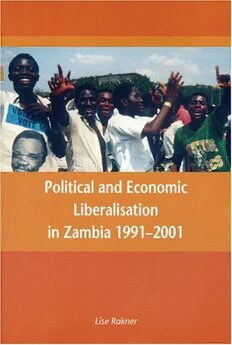
Political and Economic Liberalisation in Zambia 1991-2001 PDF
235 Pages·2003·2.526 MB·English
Most books are stored in the elastic cloud where traffic is expensive. For this reason, we have a limit on daily download.
Preview Political and Economic Liberalisation in Zambia 1991-2001
Description:
This book analyses the implementation of political and eco-nomic liberalization in Zambia during the first two election periods (1991–2001). Focusing on the negotiations between government and the key domestic interest groups, as well as the dialogues between the MMD government and the international donor community, the book argues that despite a disastrous socio-economic record, the processes of political and economic liberalization proceeded concomitantly without seriously affecting or undermining each other. Contrary to expectations linked both to the political and economic reform processes, executive dominance increased in Zambia in the 1990s. Stressing continuity rather than change, the analysis of Zambia’s reform processes suggests that the practices of patronage politics associated with authoritarian regimes are compatible with processes of political and economic liberalization.
See more
The list of books you might like
Most books are stored in the elastic cloud where traffic is expensive. For this reason, we have a limit on daily download.
